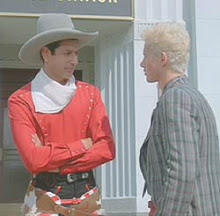Produced by Roy Thomas Baker; written by Ric Ocasek
Did not make pop charts 1978
Did not make pop charts
The one time I ever had an extended conversation with Greil Marcus, after a while the talk turned to his friend Dave Marsh and my semi-obsession with The Heart of Rock and Soul. I talked about how the book gave me a window onto a generational experience that I had never quite comprehended before on a visceral level, but I also mentioned that it was weird for me how there were bands that Marsh discounted that held more significance for those, like myself, of a slightly younger generation. "Like what?" he asked. "Like The Cars," I instinctively blurted out.
I think every generation has bands like this, but for those Americans around my age, the Cars just captured something that was in the air. You could love True Punk in the 1970s and also love the sly subversion that the Cars slipped into the mainstream without most people realizing it. This song may be one of the purest statements of male masochism that has ever made it into regular rotation on classic rock stations. It helped usher in the whole great era of Pop Loserdom that I've referred in earlier postings and will treat at greater length later, but let's just say for now that this song has a kind of John the Baptist relationship to the later post-punk ironic reinvention of masculinity.
And only Ric Ocasek could sing this song. Whenever anyone suggests to me that the Cars were conformist treacle, I remind them to listen to Ocasek's voice. It is innately alienated, no matter what he may actually feel about the words that he is singing. Much like Pee Wee Herman, Ocasek could be singing "Mary Had a Little Lamb" and it would be conjuring up all kinds of deviant failure.
PS: If you can find a copy of the original demo for this song [featured on Mass Ave, the Boston entry in the old Rhino DIY series], grab it. It was enormously successful on local Boston radio stations before the band ever got a contract, and it is much, much rawer.
Yeah sure I can dupe you a copy . . .



